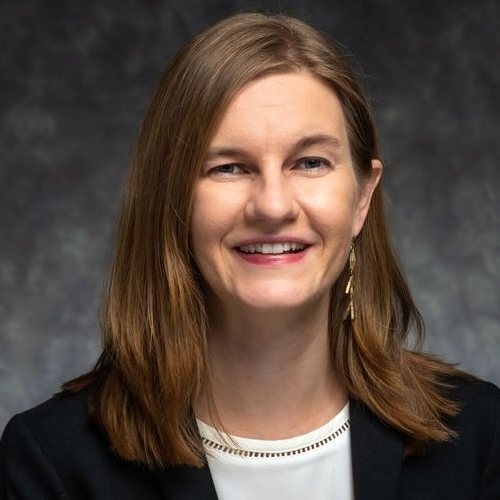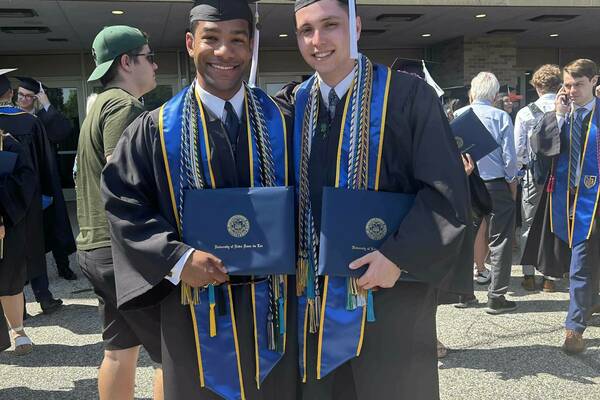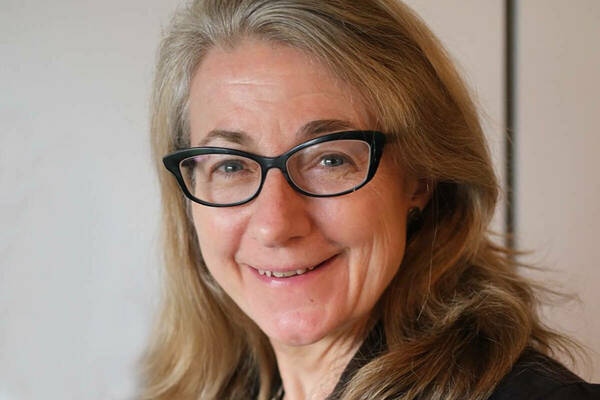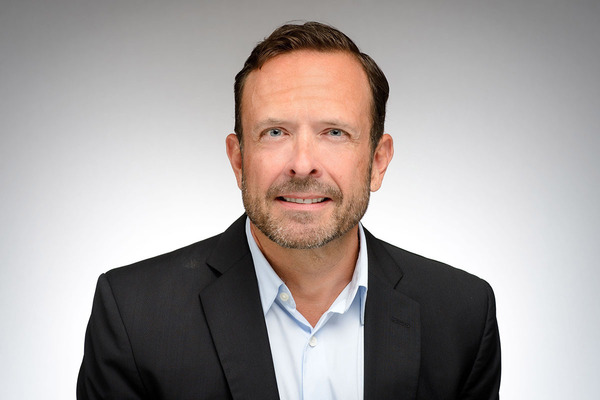University of Notre Dame political historian Katlyn Carter’s book, Democracy in Darkness (Yale University Press, 2023) is winning awards and being hailed by reviewers as revelatory, erudite, and essential reading.

The book — which details how American democracy was born in secrecy rather than transparency — earned the Gilbert Chinard Book Prize from the Society for French Historical Studies. It also was shortlisted for the Rodel Institute’s Edwards Book Award for its outstanding contribution to the understanding and practice of democracy and American politics, and it received an honorable mention for the Louis Gottschalk Prize by the American Society for Eighteenth-Century Studies.
In this interview, Carter discusses her reaction to the book’s success, the role of transparency and secrecy in democracy, and her next project on the politics of truth in the 18th century.
Please tell us a bit about yourself.
I’m from Portland, Oregon, and went to UC Berkeley, where I majored in history and was a reporter and editor at the campus newspaper, The Daily Californian. After graduating, I moved to Washington, D.C., and I worked in media relations on progressive issue-based campaigns to advocate for legislation like food safety reform and renewable energy standards. I knew I wanted to go back to school and study history, which I did at Princeton University. In graduate school, I brought together my interest in politics today with the history of democracy and media to arrive at my book topic. Before arriving here at Notre Dame, I was a postdoctoral fellow at the University of Michigan. Outside teaching and writing, I love to listen to podcasts, read fiction, and spend time outdoors with my husband and two young children.
Congratulations on the awards and reviews for Democracy in Darkness. What does this feedback mean to you?
The warm reception means a great deal to me. Overall, I spent a decade working on this project, from its inception in graduate school to seeing it published. That’s a long time! It was also a time in which a lot of strange, interesting, and sometimes startling events happened in politics, and I increasingly felt an urgency to understand the topic. When the book receives positive feedback, I feel hopeful that I was able to contribute even a little bit to our understanding of democracy.
Why was it important for you to write Democracy in Darkness? What impact do you hope it could have?
I wrote this book because I was curious about how representative democracy came to be and how that initial process continues to shape the way it operates today (in the U.S., and abroad). What does it really mean for a government to be by and for the people? This fundamental question piqued my interest.
When I looked into how people in the 18th century thought about that same question, I quickly saw that the topic of secrecy in government was very important to their thinking. While we tend to see secrecy today as a major threat to democracy — and many in the 18th century did as well — there were also many in the past who saw it as potentially beneficial. I had never really considered how crucial decisions about transparency and secrecy can be to how a democracy works, but my sources continued to highlight how important these decisions were when setting up republics for the first time.
I think recognizing the importance of these questions, and the nuance in terms of their impact on democracy, is crucial if we want a just, efficient, and democratic government. I hope the book highlights this and contributes to a discussion about how democracy works and how we want it to work.
While doing research for your next book project, “The Politics of Truth in Early America,” what have you learned about how truth is arrived at in a democracy? How do we determine whom to trust and can we apply these lessons today?
In short: Americans have never agreed on the Truth with a capital T, or whom to trust in seeking it. While that might seem pessimistic, I actually think it’s helpful for putting our current situation in context. Today is not the first time Americans have grappled with challenges of misinformation and disinformation, fractured and polarized media landscapes, or fundamental disagreements on what is true and false.
The early republic was a time of real experimentation with democratic government and with the public sphere. With this experimentation, there was a lot of anxiety and conflict about the truth — how to secure it, what it was, and whether it mattered in politics. I think knowing this — and knowing how Americans tried, and often failed, to resolve this conflict at the time — is helpful as we try to make sense of our current situation and devise solutions.
How has your previous work in media relations shaped your perspective and choice of research topics?
My job in media relations gave me firsthand experience working in politics at the point of contact between elected officials and “the public,” via the media. This experience raised a lot of questions that I decided to study historically and it provided me with a well of personal experience to draw upon in my research. Thinking about this dynamic (between elected officials, the people, and the press) is at the root of the book topics I’ve chosen.
What’s next?
I’m excited to continue sharing my book, particularly during this election season, with speaking engagements at other universities and libraries as well as podcast interviews. Otherwise, I’ll be working on "The Politics of Truth in Early America" during the spring semester at the Shelby Cullom Davis Center for Historical Studies at Princeton University.


